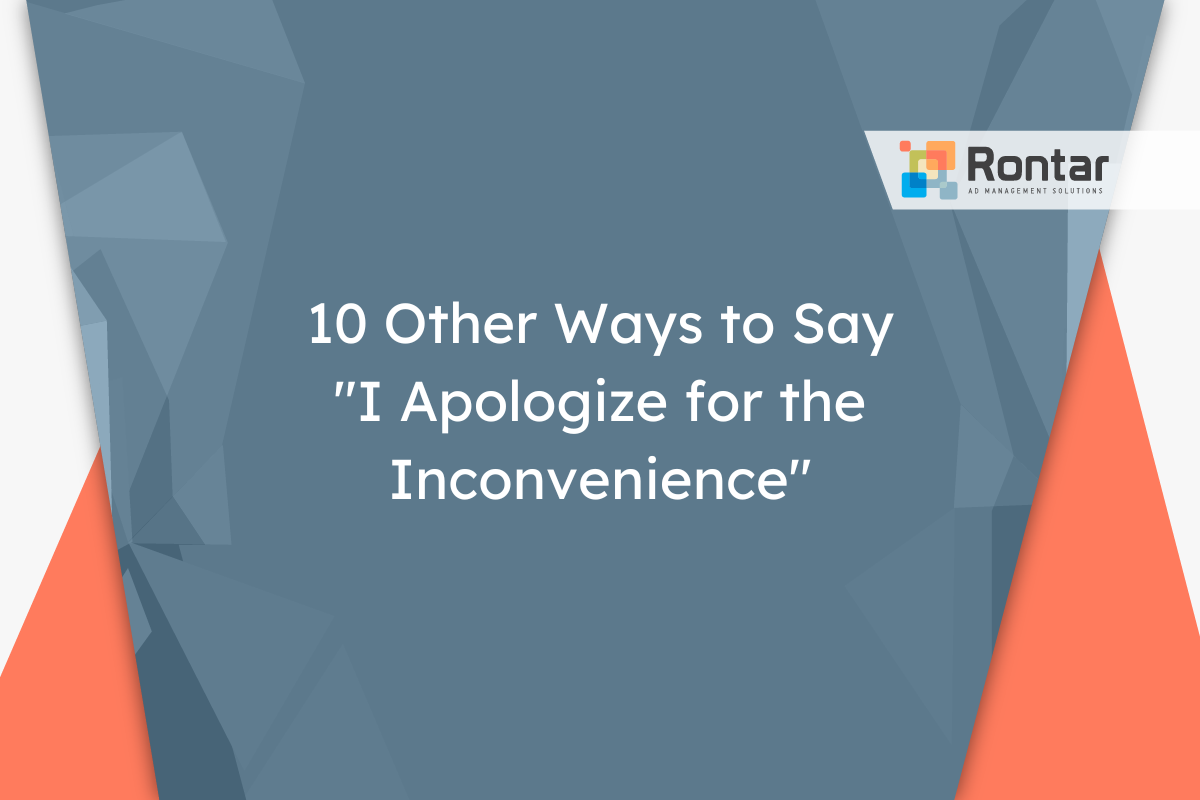10 Other Ways to Say “I Apologize for the Inconvenience”

Apologizing for an inconvenience in a professional setting shows that you care about your relationships and are willing to make things right. However, repeating the same phrase can diminish its impact.
This article lists ten alternative ways to say “I apologize for the inconvenience” in a workplace environment. Each option keeps your message fresh and sincere, ensuring your apology is well-received.
Is It Professional to Say “I Apologize for the Inconvenience”?
Yes, saying “I apologize for the inconvenience” is a professional, formal, and polite way to express regret for any trouble caused. This phrase is versatile and can be used in various situations, especially in customer service interactions, formal emails, or any professional scenario where you need to acknowledge a mistake or a problem.
It is suitable for all types of recipients, including clients, customers, colleagues, and superiors, across different communication channels such as emails, letters, and in-person conversations.
Here’s an example:
Dear Rebecca,
We have reviewed your account and noticed that there was a delay in processing your last request. I apologize for the inconvenience this may have caused you. We are currently taking steps to ensure this doesn't happen again.
Thank you for your understanding and patience.
Warm regards,
Mark Thompson
Customer Service Representative
Let’s talk about the pros and cons of using this phrase.
Pros:
- Shows empathy and understanding.
- Helps maintain a professional tone.
- Suitable for a wide range of situations and recipients.
Cons:
- Can become overused, reducing its impact.
- May seem insincere if not accompanied by corrective actions.
Sometimes, one might want to use an alternative phrase to “I apologize for the inconvenience” to make the apology seem more personal or specific to the situation. In contexts where overuse has made the original phrase feel less meaningful, finding a synonym can refresh the message and tailor it closer to the exact circumstances. Alternatives also help in fitting the apology more closely to the tone of the conversation or the relationship with the correspondent.
10 Other Ways to Say “I Apologize for the Inconvenience”
Here are ten popular alternatives to “I Apologize for the Inconvenience” that maintain a professional tone.
- Sorry for any trouble caused.
- We regret any disruption this may have caused.
- My apologies for the disruption.
- I’m sorry for the hassle.
- Please accept our apologies for any disruption.
- Our apologies for the inconvenience.
- Regretfully, we encountered an issue.
- Sorry for the mix-up.
- We’re sorry for any difficulty this caused.
- I regret any inconvenience caused.
1. Sorry for any trouble caused.
This alternative is a bit less formal than the original phrase but still very professional and polite. It gets straight to the point and is perfect for when you need to keep your message brief. It shows empathy without being overly elaborate. This phrasing works well in emails, informal letters, and direct communication.
It suits various professional contexts, especially when addressing customers or colleagues directly about minor issues that have been resolved or will be promptly. It balances formality and friendliness.
Here’s a brief example:
Dear Alex,
I wanted to reach out personally to say sorry for any trouble caused by our service delay yesterday.
Best,
Emily
2. We regret any disruption this may have caused.
Compared to the original phrase, this alternative has a more formal tone and is especially suitable when acknowledging significant inconveniences. It’s professional, showing the sender’s sincerity without diminishing the receiver’s experience. This format is best used in formal business communications where clear respect and responsibility are paramount.
This phrase is especially apt in communications with clients and partners following significant service disruptions or failures. It’s perfect for official emails and formal letters.
Here’s how you can use it:
Dear Valerie,
We want to express our sincere regret for any disruption this may have caused.
Sincerely,
The Team at Green Solutions
3. My apologies for the disruption.
This is a concise, polite option that directly addresses the inconvenience caused. It’s slightly more personal than the original phrase, making it a good choice for one-on-one communication. It fits well in professional settings where you have a direct relationship with the recipient.
Use this alternative in emails or direct messages when you are personally responsible for the oversight or mistake. It’s perfect for situations where a personal touch is required without straying into informality.
A sample email:
Dear Marcus,
I just wanted to reach out and offer my apologies for the disruption.
Kind regards,
Sophie
4. I’m sorry for the hassle.
This alternative is more informal than the original but still maintains a professional demeanor. It’s great for use in less formal business contexts or internal communications. The word “hassle” downplays the severity of the inconvenience, so it’s best used for minor issues.
It’s best suited for emails or messages to colleagues or clients you have a more relaxed relationship with, particularly when the inconvenience was more of an annoyance than a major issue.
Here is a brief example:
Hi Jordan,
Just wanted to say I'm sorry for the hassle with the report yesterday.
Cheers,
Dana
5. Please accept our apologies for any disruption.
This phrase is a formal and polite way to express regret, similar to the original phrase but with a slight variation in wording. It’s suitable for use in official communications, conveying a sense of collective responsibility. This wording is appropriate when an organization as a whole wishes to express regret to affected parties.
It’s particularly fitting when addressing customers, partners, or large groups affected by a service issue or disruption, regardless of the medium of communication.
An example email:
Dear Clients,
Please accept our apologies for any disruption you may have experienced last week.
Warm regards,
Customer Service Team
6. Our apologies for the inconvenience.
This phrase is closely aligned with the original in terms of formality and politeness. It shifts the apology from an individual to the collective, making it highly suitable for official communications from a company or team. It’s a strong option for messages intended to convey a unified sentiment of regret from a group.
This alternative works well in formal emails or announcements to clients, customers, or stakeholders, particularly when the issue has affected a wide audience.
A sample message:
Dear Customers,
Our apologies for the inconvenience caused by the system outage yesterday.
Best,
The Customer Support Team
7. Regretfully, we encountered an issue.
This version is more direct and focuses on the issue rather than the inconvenience itself. It is professional and polite, making it an excellent choice for communications where you need to inform the recipient of a problem. It’s particularly effective when followed by an explanation of the steps taken to resolve the issue.
This phrasing is suitable for reporting issues to superiors, stakeholders, or clients, particularly via email or professional messaging platforms, where clarity and brevity are vital.
An example for clarity:
Dear Team,
Regretfully, we encountered an issue with our internal system yesterday.
Best,
Laura
8. Sorry for the mix-up.
“Sorry for the mix-up” has a casual tone yet remains professional enough for workplace communication. It suggests a misunderstanding or mistake rather than a significant inconvenience, making it ideal for light-hearted or minor issues. This phrase is well-suited for internal communications or with clients you have a more casual relationship with.
It shines in emails or messages where acknowledging a small error quickly and moving on is the goal, particularly when the error had minor consequences.
A handy email example:
Hi Keith,
I wanted to reach out and say sorry for the mix-up with your schedule.
Thanks,
Pat
9. We’re sorry for any difficulty this caused.
This phrase is a well-balanced, formal, and polite apology that emphasizes the receiver’s potential struggles. It makes it suitable for more serious inconveniences or issues. This option works well in both customer-facing and internal communications.
It’s particularly useful in situations where the extent of the inconvenience isn’t fully known, allowing for a respectful acknowledgment of any potential impact. This phrasing is versatile, fitting a range of communication mediums including emails and letters.
Here’s how it might be used in an email:
Dear Partners,
We're sorry for any difficulty this caused during the system upgrade.
Sincerely,
The Operations Team
10. I regret any inconvenience caused.
This alternative keeps the apology straightforward and professional. It is nearly as formal as the original phrase and works perfectly in situations where you need to formally acknowledge an error or issue. It’s especially effective in written communications where a personal apology is required.
This phrase is suited for formal letters, emails, or announcements directed at customers, clients, or colleagues, especially when the sender is directly responsible for the inconvenience.
And here’s a sample email utilizing it:
Dear Samantha,
Please be informed that your request has been delayed. I regret any inconvenience caused.
Regards,
Tom
Final Thoughts
Choosing the right words to apologize in a professional setting is essential. The ten alternatives provided here offer different ways to express regret while maintaining a sincere and polite tone. Using these variations can help keep your apologies feeling fresh and genuine, which is crucial for building and maintaining trust in any professional relationship. So, the next time you find yourself needing to apologize for an inconvenience, consider which of these options best fits the situation and your relationship with the recipient.






